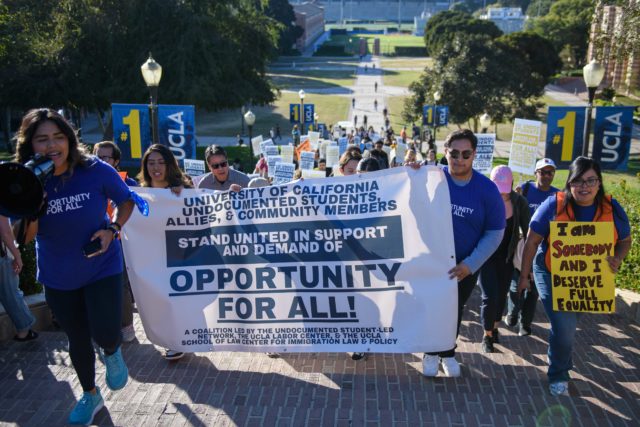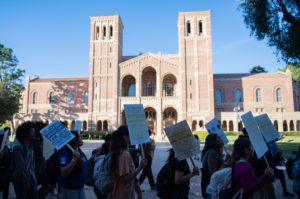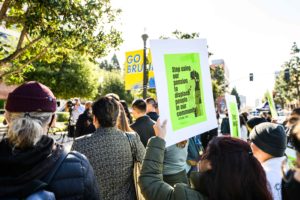This post was updated April 10 at 10:01 p.m.
A new bill passed through the state assembly committee Tuesday could allow for the establishment of on-campus job opportunities for students without legal immigrant status in the UC.
The Assembly Higher Education Committee approved Assembly Bill 2586 – also known as the Opportunity for All Act – introduced by Assemblymember David Alvarez, who represents the state’s 80th Assembly District. If passed by the state legislature and signed into law, the bill would provide equal opportunity, nondiscriminatory employment opportunities for students without documentation in the UC, California State University and community college systems.
Last May, the UC Board of Regents unanimously voted to create a working group to determine the implementation and viability of allowing these students to work on-campus jobs, including teaching assistant and research positions. After the board’s subsequent decision in January to reject its implementation plan and defer the consideration of other efforts for a year, the Opportunity for All campaign – a student-led, UC-wide advocate coalition for undocumented students – had to break new legal ground, said Ahilan Arulanantham, faculty co-director of the Center for Immigration and Law and legal counsel for Opportunity for All.
[Related: UC Board of Regents votes to explore employment for students without legal status]
Arulanantham said he was well aware of the bill before the regents’ January decision, though he initially thought it would be an unnecessary measure.
“Until January, I really believed what they said in May,” Arulanantham said. “Once the vote had taken place, then I understood entirely the need for legislation as a way to get fair treatment of all the students.”
The January decision also had a profound impact on the morale of student organizers, added Jeffry Umaña Muñoz, a fourth-year Chicana and Chicano studies and labor studies student who is an organizer for Opportunity for All. Muñoz said the bill’s introduction was revitalizing for the campaign, allowing students to see tangible effects of their protests and advocacy.
[Related: UC rejects plan to hire undocumented students, halts consideration for a year]
“No matter what we did, no matter how many times we poured out our story to the UC Regents and President Drake (UC President Michael Drake), nothing was ever enough to convince them of the need for this program,” Muñoz said. “Now, they (the California legislature) are saying that all of our work has been enough. All of our work has not gone in vain.”
Muñoz added that the campaign and the committee’s passage of AB 2586 enlivened the immigrant-student community across the UC and state to pursue more than only equal-opportunity employment.
[Related: Students launch hunger strike, pressure UC Regents to hire undocumented students]
The regents had expressed concerns in their January meeting about UC employees being at risk for prosecution if they were to hire students without legal status. However, Arulanantham said he believes these claims have little legal legitimacy.
According to a 2022 letter from the Center of Immigration Law and Policy, the 1986 Immigration Reform and Control Act that requires a social security number for employment would not apply to a state government agency, such as the UC. The letter also said the Supreme Court has consistently recognized individual state rights to employ government employees, which would allow students without legal documentation to work campus jobs.
Arulanantham said the January ruling made the state-level bill a necessary reinforcement for the campaign.
“We did not think it was a compelling concern even before,” he said. “The notion that people would be prosecuted for doing what they’re required to do under state law is quite fanciful.”
Both Arulanantham and Kent Wong, project director of labor and community partnerships at the UCLA Labor Center, said they were aware of possible plans for the bill months before its conception. Wong, whose 20 years of research have focused on students without legal documentation, said the regents’ failure to consider an implementation plan shifted the campaign’s legal maneuvers, bringing the issue to the state legislature that is historically supportive of undocumented students.
However, Wong said it is still unclear if the UC Board of Regents would have to reconsider the bill or if the bill would automatically apply to each system if passed through the state legislature and the governor’s office.
The bill was a tremendous victory for the Opportunity for All campaign and the many students who participated in the group’s advocacy efforts, Muñoz said. He added that the campaign was an inspiring effort for undocumented students across the country.
“We (My parents and I) were so afraid that speaking out or being visible would mean losing everything that we have fought so hard for,” Muñoz said. “Being able to pull together not just students from UCLA campus or from LA but from across the state that shared these experiences, and literally pulled people out into the limelight, has been an incredibly impactful experience.”






Comments are closed.